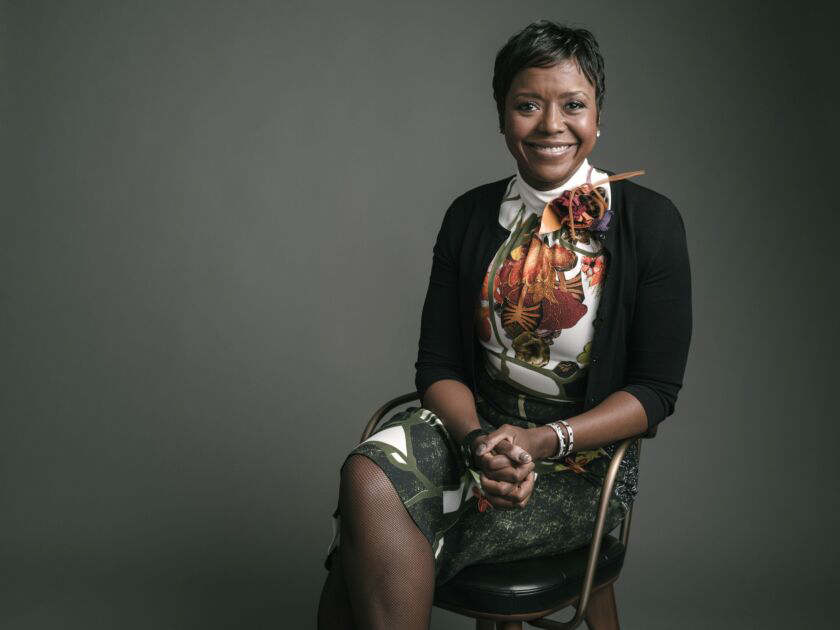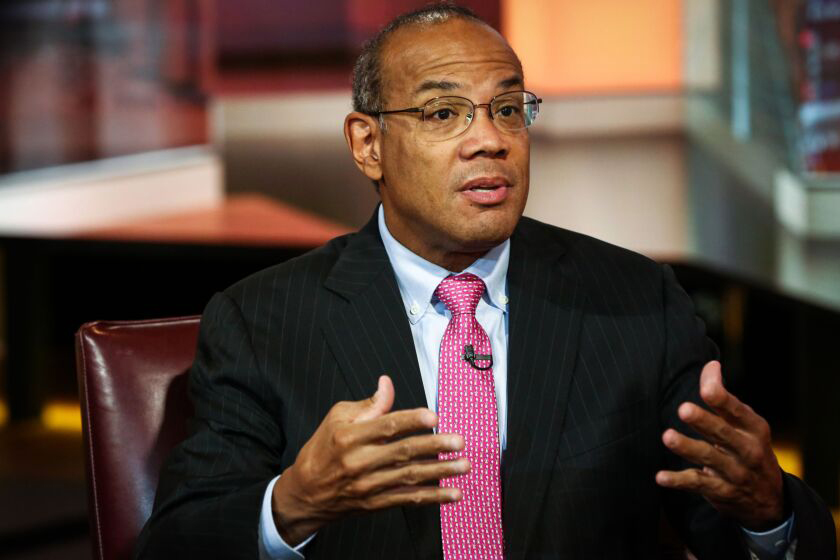John Rogers, the founder of Ariel Investments, speaks during an August 2017 interview. The Chicago-based firm was the first Black-owned money manager at the time of its launch in 1983. Image: Bloomberg News
A trailblazing money manager is embarking on new territory for the firm while driving Congressional scrutiny into the largest fund firms’ racial equity pledges.
Ariel Investments — the Chicago-based asset manager led by co-CEOs John Rogers and Mellody Hobson and the first Black-owned mutual fund company at its launch in 1983 — has unveiled new collaborations in the past four months with Charles Schwab and Vanguard. In the last year, Schwab launched the first ETF with Ariel as its sub-advisor, the Schwab Ariel ESG ETF, and Ariel unveiled its initial private equity initiative with a commitment from JP Morgan Chase to co-invest up to $200 million in future transactions.
At the same time, Rogers’ longtime outspoken advocacy for boosting the low share of assets allocated to asset managers owned by women and minorities drew the attention of the House Financial Services Committee’s Subcommittee on Diversity and Inclusion, which released an unprecedented study in December tracking the workforces and practices of 28 major firms. Similarly, with Schwab Asset Management launching its first ever active ETF in November and Vanguard adding Ariel last month to two other sub-advisors in a billion-dollar fund, the joint efforts reflect new aspects of existing connections among the firms, according to Bonnie Orlowski, Ariel’s head of consultant relations and financial intermediaries.
“In both cases, there’s a very long-standing relationship between our organizations,” Orlowski said. “We have just a tremendous amount of respect for what Schwab and Vanguard have accomplished.”
A thought and industry leader
Ariel has accomplished quite a lot itself. The firm has $18.3 billion in assets under management, with a company motto of “slow and steady wins the race” and a logo with a turtle. As examples of the ties between Ariel and the other firms, for more than two decades Schwab and Ariel have conducted annual surveys comparing the investing views and habits of Black and white Americans. With Vanguard, Hobson has told Orlowski that she’s been engaging with research teams “literally her entire career,” Orlowski said in an interview.
Rogers is the son of a Tuskegee Airman and the first African American woman to graduate from the University of Chicago Law School, and he has been a long-admired figure for younger Black professionals. He’s led the way his entire career in calling for the industry to lift the current level of 1.4% of asset managers’ assets that’s allocated to women- and minority-owned firms. At the subcommittee hearing about its report on the topic in December, Chair Joyce Beatty mentioned Rogers as one of the inspirations for the research into hiring, contracting and board diversity.
“These findings reinforce what we heard in that initial hearing last Congress from John Rogers, who sat where you’re sitting now to testify, when he said we must tackle inequality through business opportunity,” said Rep. Beatty, a Democrat from Ohio. “While this report and hearing will not transform the industry overnight, we seek to bend the arc of progress and expand employment and business opportunities for both men and women and minorities by opening eyes and drawing attention to the glaring inequities in this corner of our society.”
In his written testimony at the prior hearing in June 2019, Rogers said the low share of assets managed by minority and women-owned firms has come as a result of “a tendency to work with people you know and with whom you are comfortable” and unconscious bias.
“Third, many banks, corporations and nonprofits have embraced well-intentioned supplier diversity programs emphasizing construction, catering, janitorial services and other commodity-related fields,” Rogers said. “However, this approach excludes us from the parts of the economy where wealth, power and jobs are created today, such as asset management and other professional services. I would go as far as calling it a modern-day Jim Crow.”
Rogers praised Hobson as one of the leaders helping to change the industry. Ariel appointed her its co-CEO in 2019 after she spent nearly 20 years as its president. Hobson currently serves as the chair of the board with Starbucks and as a director with J.P. Morgan after prior tenures as chairman of DreamWorks Animation’s board and a member of Estée Lauder Companies’ board.

Ariel Investments co-CEO Mellody Hobson posed for a picture in September 2017. She has worked for the firm for three decades. Image: Bloomberg News
New business areas
Last February, the firm opened Ariel Alternatives, which is a PE firm investing in companies with $100 million to $1 billion in annual revenue under what it calls “Project Black.” Ariel Alternatives had $873.7 million in assets by the end of last year, according to the firm. The Ariel initiative will invest in businesses owned by Black and Hispanic entrepreneurs and other firms that will become certified minority business enterprises.
“This scale — which heretofore has been largely absent among minority-owned businesses — will enable these enterprises to compete on the same footing with Tier 1 suppliers,” Hobson wrote in a letter to Ariel’s investors. “The key point here is that Project Black leverages existing corporate spends — what Fortune 500 companies are already doing — in a way that can help narrow the wealth gap in underrepresented communities. We are helping to nurture a virtuous circle of spend and build. By spending with firms owned and run by people of color, big business is able to simultaneously help foster and elevate our communities. This is a powerful dynamic.”
The Schwab-Ariel product is a semi-transparent ETF with a focus on small- and midsize equities rather than the growth and large-cap securities often included in funds using ESG criteria. With an operating expense ratio of 59 basis points, the fund screens out companies who get their main sources of revenue from tobacco, fossil fuels, private detention firms and weapons manufacturers.
“Our first proprietary ESG fund addresses a clear gap in the market for a small- to mid-cap ESG fund managed through a value investing lens,” Malik Sievers, Schwab’s head of ESG strategy, said in a statement. “We are excited to bring investors a new option for incorporating ESG into their portfolios and which may help them to tailor their exposure to ESG investing based on their goals and preferences.”
Vanguard’s collaboration with Ariel added it to the group of active managers tapped by the passive investing pioneer that also has more than $1.8 trillion in active assets. Alongside existing sub-advisors Cardinal Capital Management and Frontier Capital Management, Ariel is now helping to manage the Vanguard Explorer Value Fund, which has $1.2 billion in assets. In the initial phase of the collaboration, Ariel will oversee 10% of the fund’s assets.
“Vanguard continuously seeks out leading investment firms that demonstrate the expertise, diversity of thought and accountability needed to drive successful outcomes for investors,” Dan Reyes, head of the firm’s Portfolio Review Department, said in a statement. “We believe that Ariel’s talented portfolio management team and patient approach to investing complements the fund’s strategy and existing advisors.”
A long track record into the future
Orlowski, the firm’s head of consultant relations and financial intermediaries, works with institutions and buyers who act as gatekeepers for large wealth managers. While she has limited interactions with advisors, Ariel’s mutual funds are “pretty widely available” through the major wealth managers, Orlowski said. With only about 100 employees across the firm, Ariel won’t be calling advisors’ practices and bombarding them with LinkedIn messages.
“We’re a smaller firm,” she said. “We don’t have the luxury of an army of wholesalers engaging with advisors.”
This past November brought the 35th anniversary of the launch of Ariel’s flagship Ariel Fund, where Rogers remains the lead portfolio manager. From its inception through October 2021, the fund has an annualized return of 11.60%, and it’s one of only 63 mutual funds that have track records of more than three decades.
“As we have mentioned on many occasions: Anyone can get lucky over the short term; real skill shines through over time,” Hobson said in a letter to the firm’s investors marking the occasion. “As we sit here 35 years later, we are pleased with these results but not taking any victory laps. The stock market keeps us humble, and our race has no finish line.”
Source: financial-planning.com


Thanks for finally talking about > Ariel Expands Into New Fields As An Industry
Pioneer And Force For Change < Liked it!
Thank yoou foor any otherr informatjve site. The plaace elsee may
I am getting thgat tpe of information written inn sudh an ideaal method?
I have a undertaking tyat I aam just now operating on, annd
I’ve beeen on the glannce oout for sujch information.